The Sacrifice Blu-ray Movie
HomeThe Sacrifice Blu-ray Movie 
OffretKino Lorber | 1986 | 149 min | Rated PG | Jul 05, 2011
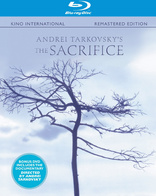
Movie rating
7.8 | / 10 |
Blu-ray rating
| Users | 3.4 | |
| Reviewer | 4.5 | |
| Overall | 4.2 |
Overview
The Sacrifice (1986)
Alexander is celebrating his birthday with family and friends when they receive some stunning news from the radio. World War III has erupted, and the end of the world is near. In order to avert the apocalypse, Alexander makes a bargain with God: He'll give up everything he values in life, including his beautiful home and beloved son. So, when Alexander awakens from this episode, as if from a dream, he sets about doing just that.
Starring: Susan Fleetwood, Allan Edwall, Erland Josephson, Sven Wollter, Guðrún GísladóttirDirector: Andrei Tarkovsky
| Drama | Uncertain |
| Foreign | Uncertain |
Specifications
Video
Video codec: MPEG-4 AVC
Video resolution: 1080p
Aspect ratio: 1.67:1
Original aspect ratio: 1.66:1
Audio
Swedish: LPCM 2.0
Subtitles
English
Discs
50GB Blu-ray Disc
Two-disc set (1 BD, 1 DVD)
Playback
Region free
Review
Rating summary
| Movie | 5.0 | |
| Video | 3.5 | |
| Audio | 4.0 | |
| Extras | 3.0 | |
| Overall | 4.5 |
The Sacrifice Blu-ray Movie Review
Encounters at the end of the world in Tarkovsky’s sublime final film.
Reviewed by Casey Broadwater July 9, 2011The great Russian director Andrei Tarkovsky made just seven feature films during his nearly thirty-year career—including Andrei Rublev, Solaris, The Mirror, and Stalker—and his swansong, The Sacrifice, serves not only as a summation of his life’s work, but also as his final thoughts on faith, mankind, and the modern age. Shot while Tarkovsky, then 53, was dying of cancer, the film has an inescapably reflective, elegiac quality, but its inherent sadness is bookended in the opening and closing scenes by a potent symbol of optimism—a tree that will bloom if tended—and it’s worth noting that the director dedicated the film to his son Andriosha “with hope and confidence.” In his excellent book on film theory, Sculpting in Time, Tarkovsky himself stated that the film is “a parable” and that “the significant events it contains can be interpreted in more than one way.” While theses events are often intentionally vague—there is the possibility, for example, that some of the film, if not most of it, is a dream—the subject of the parable is quite clear: self-sacrifice as an act that’s capable of changing individual lives and indeed all of human history.

The Sacrifice is something of an homage to director Ingmar Bergman, as the two filmmakers shared a mutual admiration. (Bergman once called Tarkovsky “the greatest, the one who invented a new language, true to the nature of film, as it captures life as a reflection, life as a dream.”) One of only two of Tarkovsky’s features to be produced outside the U.S.S.R., the film was shot on the Swedish island of Faro—where the reclusive Bergman lived and set many of his own movies—and the lensing was done by longtime Bergman collaborator Sven Nykvist, one of the world’s most acclaimed cinematographers. The Sacrifice also stars Erland Josephson, who, like Max Von Sydow, showed up in most of Bergman’s important works. These surface similarities, however, give way to deeper shared thematic concerns. Both directors were cinematic philosophers of religion and faith—exploring mankind’s uneasy relationship with God—and both had preoccupations with the possibility of nuclear annihilation. Of course, there are stylistic parallels between the filmmakers as well, including a fondness for surrealist dream sequences, stark imagery, and long, meandering wide shots.
The Sacrifice opens with one of the latter, a single nine-minute and twenty-six second tracking shot—the longest in the film, and the longest in Tarkovsky’s career—in which Alexander (Josephson), a late middle-aged atheist, journalist, and former actor, plants a barren Japanese tree by the seaside with his young son, whom he calls “Little Man.” (The nickname is clearly symbolic, as the boy represents the future of all mankind.) While they position the tree in the ground, Alexander tells his son—who has just had a neck surgery, and is temporarily mute—the story of a monk who instructed his pupil to diligently water a similarly withered tree at the top of a mountain until it bloomed. Alexander seems obsessed with the idea of performing a simple act—like the daily watering of a plant—that can produce a positive change in the world. Later, when the island’s quasi- prophetic postman, Otto (Allan Edwall), bicycles out to the beach to deliver a telegram, we learn that it is Alexander’s birthday. His dutiful doctor friend, Victor (Sven Wollter), has arrived, and along with Alexander’s younger actress wife, Adelaide (Susan Fleetwood), and their teenaged daughter, Marta, they plan to have a small party at their quaint seaside house, a home that looks not unlike the one in Through a Glass Darkly, the Bergman film Tarkovsky draws upon most here.
The celebration is dampened by the screech of a jet overhead, rattling the wine glasses and knocking over a pitcher of milk, which shatters on the ground. (An image the director previously used in Mirror.) An announcer on a flickering television set skirts around the obvious—World War III has begun, heralded by the launch of nuclear weapons and mutually assured destruction. The TV screen cuts to black, the phone line goes dead, and an atmosphere of apocalyptic uncertainty descends on the house. Adelaide has a mental breakdown and has to be sedated. Julia, one of the maids, refuses to wake up Little Man from his nap, hoping that if annihilation does suddenly arrive, it will happen while the boy is asleep. And Alexander, a professed atheist who nonetheless feels the world has lost its sense of spirituality, falls to his knees and recites the Lord’s Prayer. Bargaining with God, he proposes a Faustian trade: “"I will give Thee all I have. I'll give up my family, whom I love. I'll destroy my home, and give up Little Man. I'll be mute and never speak another word to anyone. I will relinquish everything that binds me to life, if only Thou dost restore everything as it was before, as it was this morning.” Salvation comes in the form of love from one of Alexander’s maids, Maria (Gudún S. Gísladóttir), who may or may not be a witch.
This is a film that should be felt first and analyzed later. There’s an emotional scene where Alexander sits with Maria in her decrepit cottage and describes the memory of trying to tame his dying mother’s overgrown garden with shears and a scythe. He breaks down in tears when he recalls looking out the window and seeing that the “order” he thought he imposed on the garden actually destroyed its wild beauty. Replace “Alexander” with “mankind” and “the garden” with “the Earth,” and you have a wonderful bit of subtext about environmentalism, but the film’s real theme is larger than even that—the need for a turn away from a purely material existence and toward some kind of spiritual, holistic approach to life. There’s no getting away from it; Tarkovsky was a professed Christian, and The Sacrifice is one of his most explicitly religious films. But don’t let this turn you off if you’re not of the same persuasion. There’s deep, poetic feeling at work here that’s truly universal.
It should go without saying that The Sacrifice is not an “easy” film—although it’s arguably one of Tarkovsky’s more accessible pictures—and not one to be watched casually. The director’s glacially slow tracking shots are both wide and long, distancing us from the characters—there are relatively few close-ups—and forcing us to mentally engage with what we’re watching. Those with the patience to see it through will be rewarded with a profound and affecting experience. This was essentially Tarkovsky’s deathbed statement—he would die less than a year after making it—and he couldn’t have chosen better parting words.
The Sacrifice Blu-ray Movie, Video Quality 
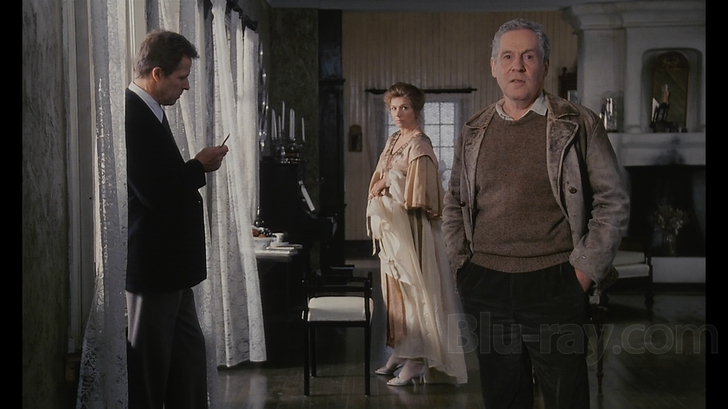
I have mixed feelings about Kino's 1080p/AVC-encoded transfer of The Sacrifice. On the one hand, the film definitely looks much better than it ever has on home video—it's quite a drastic improvement in overall clarity and color balance—but on the other, it displays some traits that detract from the beauty of Sven Nykvist's evocative cinematography. The main problem is that the image doesn't always look naturally filmic. It appears that some slight DNR has been used to smooth out grain—which is still partially there but often looks somewhat frozen in place—and edge enhancement is frequently visible in the form of white haloes that appear on hard outlines. This is especially visible outdoors, when trees and people are silhouetted against the sky, but if you look for it, it's there in just about every scene. If you have a smaller TV screen it won't be as noticeable, but those of you using larger screens or projectors will definitely see it. I don't have any inside details, but to me, this looks like a transfer that was prepared for cable broadcast. That said, there is a significant upgrade in clarity when compared to prior DVD releases. Clothing often yields up its textures, and fine detail is frequently discernable in the actors' faces. The film goes through a number of intentional color shifts—from realistic, to stark black and white, to lightly sepia tinged—and the transfer handles these changes without any problems. Although black levels can be a bit grayish during darker scenes, most color is suitably dense. It's a shame the image couldn't have been less doctored—and I'm not sure why that is—but The Sacrifice still looks strong and you won't be sorry to trade in your old DVD copy.
The Sacrifice Blu-ray Movie, Audio Quality 
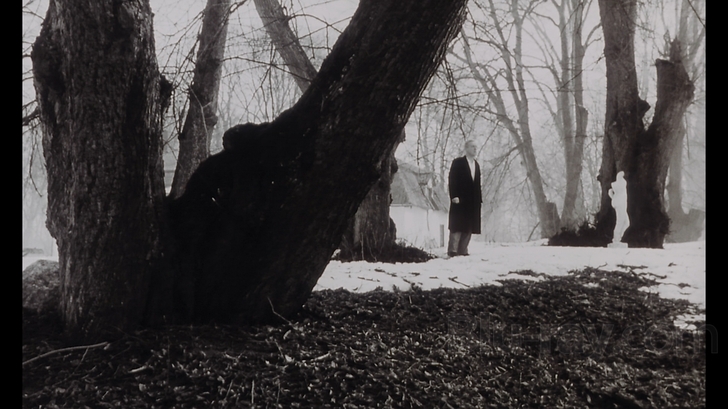
The film's spartan sound design is reproduced by way of a generally excellent Swedish Linear PCM 2.0 stereo track. My sole complaint is that you can occasionally hear some clicks and pops in the dialogue, but I prefer this to a track that's lost its character after being digitally scrubbed and tweaked. This is a highly conversational film, and the dialogue is always presented clearly at the forefront of the mix. There are a few instances when the ADR dubbing seems a bit too obvious, but this is inherent in the source material. Where this track really impresses is in its handling of the film's score, which is comprised of Bach's "Mattheus Passion," traditional Swedish chants, and fluttering Japanese flute music by Watazumido Shuso. The music sounds wonderful—the orchestration rich and the flute pieces breathy and warm. The disc includes optional English subtitles.
The Sacrifice Blu-ray Movie, Special Features and Extras 
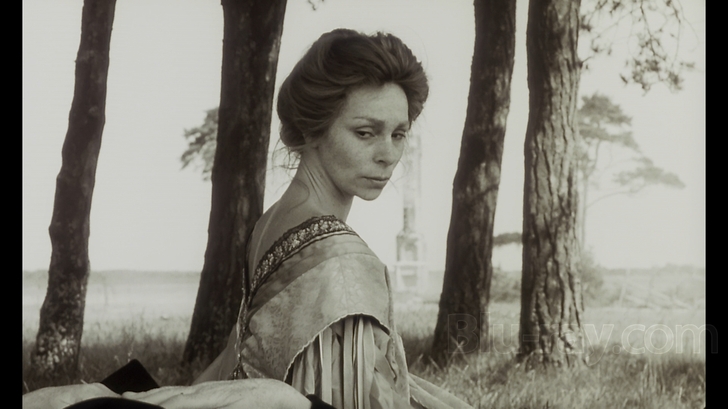
There are no special features whatsoever on the Blu-ray disc, but the package includes a DVD of the excellent documentary Directed by Andrei Tarkovsky (SD, 1:37:33), a production of the Swedish Film Institute that features insightful interviews, clips, and behind the scenes footage of the director at work on The Sacrifice, strung together with excerpts from Tarkovsky's book on film theory, Sculpting in Time. (Which you should also track down if you haven't yet.) On this disc, you'll also find two stills galleries—one for The Sacrifice and one for Directed by Andrei Tarkovsky—as well as a collection of trailers for other Kino-Lorber titles.
The Sacrifice Blu-ray Movie, Overall Score and Recommendation 
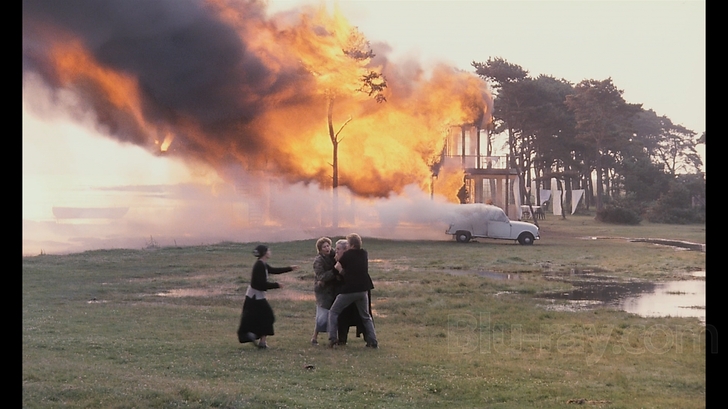
If you like serious cinema, few filmmakers are more poetic and transcendent than Andrei Tarkovsky, and The Sacrifice, his final film, is also one of his finest. Writing or talking about it simply doesn't do it justice—it needs to be seen and soaked in. Kino's high definition transfer unfortunately displays some evidence of digital manipulation, but this is still by far the best the film has ever looked outside of the theater. As a bonus the package includes a DVD with the terrific documentary Directed by Andrei Tarkovsky, which helps elucidate the director's themes and methodology. Highly recommended! While you're ordering the disc on Amazon, also consider adding Sculpting in Time—Tarkovsky's book on the art of cinema—to your cart. It's a must read.
Other editions
The Sacrifice: Other Editions
Similar titles
Similar titles you might also like

Nostalghia 4K
1983

Andrei Rublev
Андрей Рублёв | Andrey Rublev | Tarkovsky's Preferred Cut and Original versions
1966

Mirror
Зеркало / Zerkalo
1975

Ivan's Childhood
Ива́ново де́тство / Ivanovo detstvo
1962

Stalker
Сталкер
1979

Solaris
Солярис / Solyaris
1972

Satantango
Sátántangó
1994

The Turin Horse
A Torinói ló
2011

Red Desert
Il deserto rosso
1964

Cries and Whispers
Viskningar och rop
1972

Hard to Be a God
Трудно быть Богом
2013

The Cranes Are Flying
Летят журавли / Letyat zhuravli
1957

Come and See
Иди и смотри / Idi i smotri
1985

Wild Strawberries
Smultronstället
1957

Dekalog
The Decalogue
1988

Heart of Glass
Herz aus Glas
1976

Persona
1966

Werckmeister Harmonies
Werckmeister harmóniák / includes "Family Nest" (1979)
2000

Kings of the Road
Im Lauf der Zeit
1976

Wrong Move
Falsche Bewegung
1975

